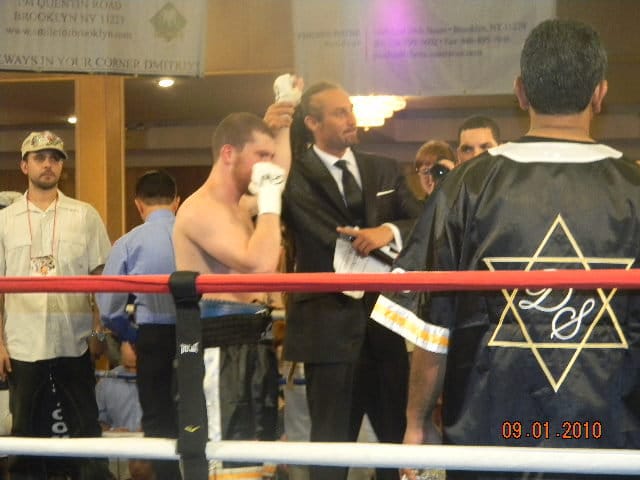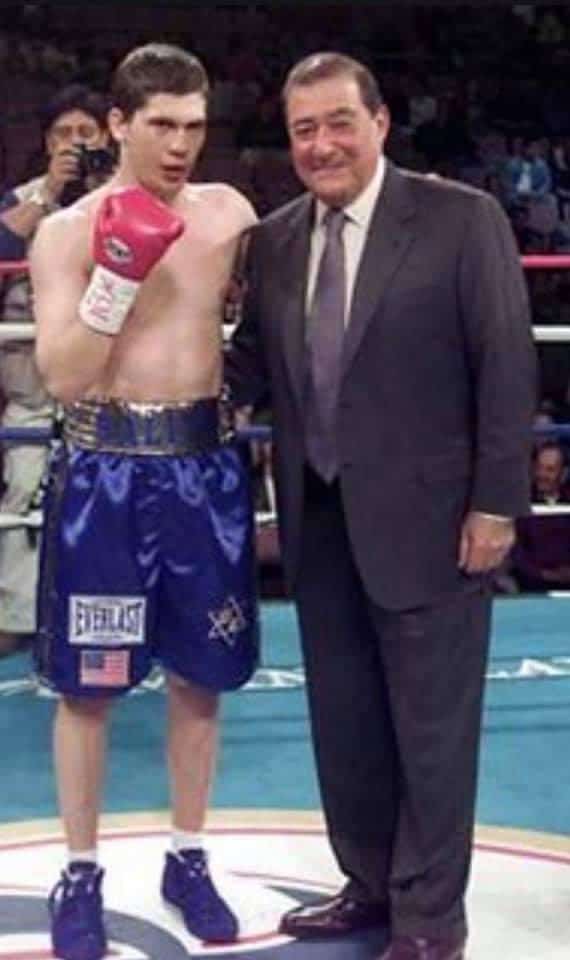
In the early to mid 1900s boxing was a Jewish sport, believe it or not. Between the times of World War I and World War II, Jewish athletes were actually known as the dominant ethnic group in American professional boxing. Nowadays, the thought of a Jewish Orthodox boxer would definitely turn heads.
Dmitriy Salita, a 39 year-old former welterweight and now-promoter, is that rare Orthodox Jew in big-league boxing. Here are some things to know about him:
- He was born in Odessa, Ukraine and moved to the New York City neighborhood of Flatbush, Brooklyn, at the age of 9
- It was antisemitism that pushed his family to leave their Ukraine home in 1991
“The Soviet Union dissipated about four months after we came to the United States,” he said in an interview. “We were in a wave of Russian/Jewish immigration and at that time the Jewish population in the former Soviet Union did not have all the rights or possibilities to progress in life. If we were good at something, we couldn’t reach the same goals or possibilities. There was discrimination.”

3. He had what he laughingly calls “a Soviet Bar Mitzvah”
Devoid of almost any religious content, “You go to a Russian restaurant, you have a cake with 13 candles and everyone gets to light one, and then they sing Yiddish songs,” he told the Jewish Chronicle.
4. He walked into his first boxing club at 13
“Encouraged by his brother, he walked into the Starrett City Boxing Club – ‘one of the best boxing gyms in New York City!’ He enjoyed the camaraderie and ethnic diversity, the respect for all regardless of race or creed. A true melting pot… It was here he met his boxing mentor, the legendary trainer: Jimmy O’Pharrow.
“Jimmy was a true leader in his community and yet, he was helping this white boy in so many ways,” Salita told The Sportsman. “Even though I was a white boy, I grew up in the Starrett City Boxing Club with Jimmy and I saw life. I was an immigrant and I had some of the same challenges that folks from different communities had. There were lots of similarities in so many ways.”

5. He started becoming a more observant Jew at age 14
When Salita was 14, his mother was seriously ill with breast cancer and shared a room with an Orthodox Jewish woman at Brooklyn’s Sloan-Kettering hospital. The woman’s husband came to visit while Salita was seeing his mother, and ultimately Salita got connected to a local Chabad Rabbi.
Pretty soon, he said in an interview, he was putting on tefillin every day and learning blessings. When his mother died, it was the same local Rabbi who arranged the funeral and helped the family say kaddish for her.

6. Boxing connects him to Judaism
“[Boxing] has always made me feel spiritual. You go in the ring, it’s just you and someone else. It had always made me look inside myself, made me connect with a higher power,” he said.
7. Salita has grappled with being a Shabbat-observant Jew and managing his work as a boxer for his entire career. Still, all the way from amateur to pro, he has stuck to his beliefs.
“When he was a boxer, it limited his ability to fight in the summer when the sun sets late. As a promoter, he has had to miss some of his fighters’ matches and use creative scheduling to make payments,” he told the New York Times.
8 years ago today I had the honor of fighting at the inaugural night of professional boxing at the Barclays Center. A venue that has now become synonymous with boxing’s biggest fights @Brooklyn_Boxing pic.twitter.com/h0jhZ6CnoT
— Dmitriy Salita (@Dsalita) October 20, 2020
8. He had a 12-year boxing career
Salita turned professional at 19 years-old. He wore a Star of David on his boxing shorts and would enter the ring to Yiddish rap, according to the Jewish Chronicle. “He is aware that there are some rabbis who counsel against boxing, arguing that Jewish law does not permit a person to offer themselves up to be hurt, but Salita says he did not go into the ring to hurt his opponent, but to win.”
Flashback landing one of my favorite punches the #LeftHook pic.twitter.com/NctwIq4vJ8
— Dmitriy Salita (@Dsalita) September 24, 2020
9. Today he works as a boxing promoter for world-champion Claressa Shields
Honored to extend my deal with the Queen of boxing one of the greatest athletes of all time @Claressashields #GWOAT pic.twitter.com/prHmLUZ1Bz
— Dmitriy Salita (@Dsalita) April 15, 2021
In 2011, Salita hung up his gloves and became a boxing promoter. He has worked with many high-profile clients including mixed martial artist turned boxer, Claressa Shields. Together, their hope is to establish Shields as the greatest female boxer of all time, according to The Sportsman.
10. Salita’s message: You can be a successful in any field, while still staying true to your Jewish values
“It was unusual to be a Jewish boxer and someone who was so observant,” he said. “When I started winning tournaments, I understood that because of my background, it would create some attention… I wanted to use my platform in a responsible way, and I wanted people to know that you can achieve and still be aligned with your values.”
Originally Published Apr 23, 2021 12:05AM EDT
